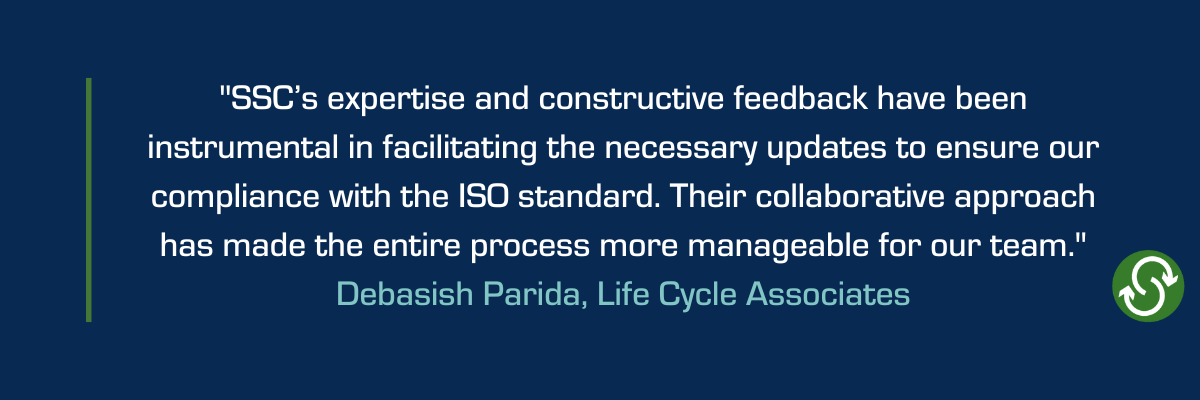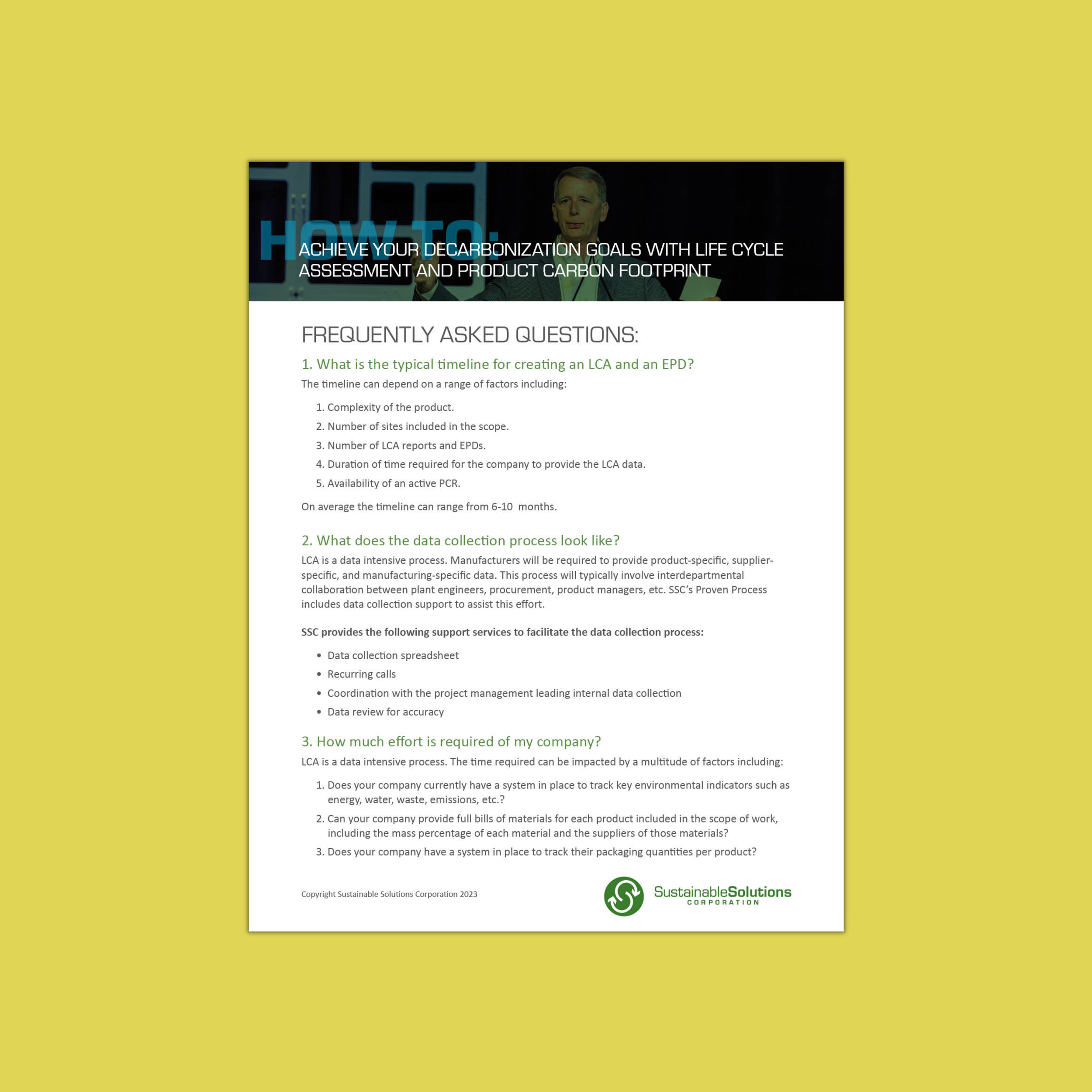LCA Reporting and Methodology
Sustainable Solutions Corporation (SSC) has over 23 years of experience in developing and delivering valuable LCAs based on international standards (ISO 14040/14044, ISO 14025, ISO 21930, and EN 15804) and market demands. We provide expert evaluation of your LCA study, ensuring that it meets the requirements of all Product Category Rules (PCR).
To conduct an effective LCA, detailed information on various aspects of the product life cycle is essential. This includes:
Raw Materials: Comprehensive data on the composition, source, and extraction methods of raw materials.
Supplier Locations and Modes of Material Transport: Data on the geographic origin of materials and modes of transport.
Manufacturing/Processing/Assembly Operations: Detailed insights into manufacturing processes, energy consumption, water consumption, support and ancillary material use, waste and wastewater production, emissions, etc.
Packaging: Data on the primary or secondary packaging materials - evaluating packaging impacts can provide opportunities for dematerialization or remissions reductions.
Distribution: Evaluation of downstream transportation methods, distances, and modes of transport.
Installation and Use: Analysis of energy and material consumption during product installation to the building site as well as impacts related to product use, including, energy/water/material consumption in use, maintenance, repair/refurbishment, replacements, and operational energy and water use.
End-of-Life: Consideration of end-of-life scenarios, including disposal, recycling, or reuse options. Manufacturers should consider the end-of-life stage during the new product development process.
Why Choose SSC?
-
Our team of experienced LCA reviewers offer an assessment of your study, bringing extensive knowledge in environmental science and industry best practices.
Furthermore, our staff includes LCA Certified Professionals (LCACPs). Achieving LCACP certification requires an LCA practitioner to demonstrate expertise in LCA practice and have a thorough understanding of the International Standards for Life Cycle Assessment, ISO 14040 and ISO 14044. Having an LCACP involved on your project will help ensure your model and assessment are conducted in accordance with International Standards.
-
We adhere to ISO, PCR, and any applicable European standards in our LCA Critical Reviews to ensure the highest level of accuracy, transparency, and credibility.
Our team of experts evaluate your LCA using ISO 14040 and ISO 14044 standards.
-
We provide detailed feedback and recommendations to help address any gaps or non-conformances in your LCA.
-
A Critical Review by SSC adds significant credibility to your LCA, making it a powerful tool for supporting certifications.
The Connection Between LCA and Scope 3 Emissions
Our LCA Critical Review process is essential for accurately identifying and quantifying environmental impacts throughout a product’s life cycle. This comprehensive analysis is crucial for understanding and reducing Scope 3 Greenhouse Gas (GHG) emissions. By leveraging the insights gained by an LCA, businesses can make informed decisions on sustainable sourcing, manufacturing, and product design, leading to overall reductions in Scope 3 emissions.
Benefits of LCA
Identify Environmental Impact Drivers
LCA can help focus limited resources to plan and implement the biggest impact reductions first.
Avoiding Material Risks
LCAs identify areas of risk and material concerns in the supply chain and production process.
Customer Demands
LCAs are used to satisfy customer sustainable supply chain requirements and demand for transparency with scientifically based data.
Waste Reduction
LCAs can also be used to calculate the impacts of various waste disposal options to reduce overall impacts and costs.
Cost Reduction
Considering alternative materials, production techniques, shipping methods, and disposal systems identifies opportunities for financial cost savings and environmental impact reductions.
Brand Recognition
Competition in the global marketplace is becoming tougher and distinguishing your company and products as a responsible brand is a solid strategy to improve brand positioning and capture market share.
Stepping Stone in CSR
Quantifying and understanding the total impacts associated with goods produced gives your organization the data needed to establish goals, prioritize initiatives, and allocate resources accordingly.
Sustainability Standards
Many markets and standards are driving whole product industries toward further transparency.
Resources
From Assessment to Action: Integrating LCAS and epds
In this document, we provide:
The transformative approaches in Life Cycle Assessments (LCA) and Environmental Product Declarations (EPD)
The three types of LCAs include Life Cycle Assessment Optimized and Comparative Life Cycle Assessments
A readiness assessment you should answer before engaging in an LCA study
Frequently Asked Questions
Glossary and key terms
Educational Series: Achieve Your Decarbonization Goals with LCA and PCF
“THESE WEBINARS WERE AN EXCELLENT USE OF TIME AND I WOULD NOT HESITATE TO SIGN UP FOR MORE.”
A comprehensive three-part educational course that teaches you the fundamentals of Life Cycle Assessments (LCA) and Product Carbon Footprints (PCF).

















